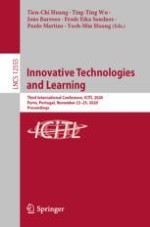2020 | OriginalPaper | Buchkapitel
A Study of Learner’s Computational Thinking Using Constructivist Universal Design Learning Package for Kindergarten Education
verfasst von : Chinnaphat Junruang, Issara Kanjug
Erschienen in: Innovative Technologies and Learning
Aktivieren Sie unsere intelligente Suche, um passende Fachinhalte oder Patente zu finden.
Wählen Sie Textabschnitte aus um mit Künstlicher Intelligenz passenden Patente zu finden. powered by
Markieren Sie Textabschnitte, um KI-gestützt weitere passende Inhalte zu finden. powered by
